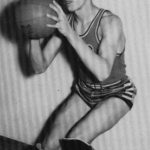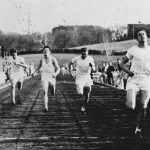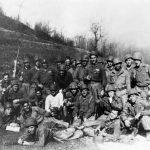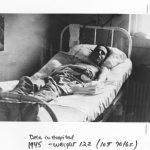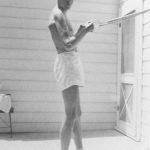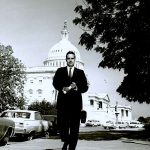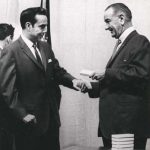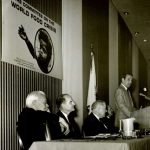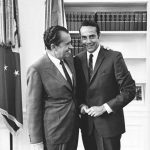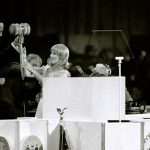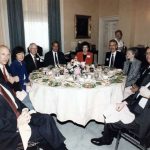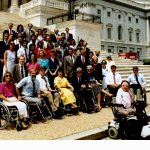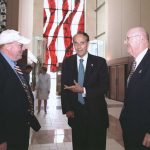Bob Dole: A Life in Pictures
July 23, 1923
Robert J. Dole was born in Russell, Kan. to Bina and Doran Dole. Like many, the Doles experienced hardship. At one point, the four Dole children shared one room, a bike and a pair of roller skates.
The 1930s
Bob Dole was a popular young athlete and a fierce competitor who lettered in three sports. Off the field, he was a polite, neatly dressed student who modeled in high school fashion shows and was active in the Methodist church. He also served as sports editor of the school newspaper. Dole also had a paper route and worked as a soda jerk at Dawson’s Drugstore.
Fall of 1941
Dole entered The University of Kansas as the first member of his family to attend college.
February 1945
Dole reported for military duty. With hopes to become a doctor, Dole trained in the Medical Corps at Camp Barkley, Texas. After training in Louisiana and Kentucky, Dole attended Officer Candidate School at Fort Benning, Georgia. In late 1944, he graduated a second lieutenant in the Army Infantry and joined the Army’s 10th Mountain Division. He was sent out from the Rome replacement depot to join the 10th Mountain Division, where Dole saw combat in the battle-scarred hills around Castel D’Aiano, Italy.
April 14, 1945
Dole was severely injured. An exploding shell smashed his right shoulder, crushed his collarbone, punctured a lung and damaged vertebrae that paralyzed Dole from the neck down. Upon his return to the U.S., Bob Dole spent 39 months in hospitals including the Percy Jones Army Medical Center in Battle Creek, Michigan. Dole’s condition was so severe that his doctors doubted that he would live.
1946
Dole returned home to Russell. Dole’s incredible will to survive soon had him exercising to the point of exhaustion, attempting to restore the use of his arms and legs. A system of weights and pulleys, devised by Dole’s father, hung on the garage wall in the Dole’s backyard. The sympathetic citizens of Russell rallied for Bob and began the “Bob Dole Fund”– a cigar box on the counter of Dawson’s Drugstore. The fund eventually surpassed $1,800.
1952
Bob Dole was elected Russell County attorney. His tireless work ethic soon became a legend along Russell’s Main Street. Long after all other businesses had closed at night, the light would still be on in his second-floor office in the county courthouse. The courthouse attorney earned $248 per month, four dollars less than the courthouse janitor was paid.
1960
Dole was elected U.S. Representative for Kansas. Bob Dole’s strategy to distinguish himself in Congress was as plain and direct as the man himself: he would represent the interests of the farmers who elected him. Beyond that, he would simply outwork everyone else. With only a small office staff, Dole read every letter himself and dictated personal responses to most. He edited his own monthly newsletter, acted as a tour guide for visiting constituents, and got the phone back to Kansas every day. He never missed a vote in the House.
July 2, 1964
Representative Bob Dole supported civil rights legislation. Dole voted in favor of the Civil Rights Act of 1964 and the Voting Rights Act of 1965, earning him two votes that were not popular with many Republicans at the time.
1966
Food for Peace Act Amendment passed. Dole began his crusade to fight hunger as early as 1962 with his support of the National School Lunch Act. In 1966, he introduced an amendment to the popular Food for Peace Act that created a trained group of volunteers known as the “Bread and Butter Corps” to travel the world instructing farmers on modern farming methods and technologies.
1968
Dole won his first Senate seat. In 1968, Dole ran for the U.S. Senate against William I. Robinson. Dole won 60 percent of the vote and the seat in the Senate. During his first term in the Senate, he supported bills to stop water pollution and make health care more accessible to those living in rural areas.
1971
Dole was appointed Republican National Chairman. He viewed the chairmanship as a stepping stone to leadership roles in the Senate. Equally important, Dole hoped to broaden Republican appeal among minority voters. He held the position for only two years, being relieved of the appointment after Republican losses in the 1972 elections.
1974
Dole supported legislation to create an Election Reform Commission. In the wake of the Watergate scandal, Sen. Dole supported legislation to create an Election Reform Commission to study the practices of political campaigns despite his friendship with Nixon. This commission materialized in 1974 with the creation of the Federal Election Commission (FEC). The FEC still operates today as an independent regulatory agency charged with administering and enforcing the federal campaign finance law.
1974
Dole won a close re-election to the Senate, defeating Bill Roy, a popular two-term congressman from Topeka. This was the first time Dole brought in outside managers, pollsters, and admen to run his campaign. The difficulty of the campaign transformed Dole’s political style. His second term represented an increased emphasis on bipartisanship, including his support of child nutrition and the Food Stamp programs that led to alliances with Democratic Senators Ted Kennedy, George McGovern and Hubert Humphrey.
December 6, 1975
Bob married Elizabeth Hanford, creating one of Washington D.C.’s most famous power couples.
August 1976
Bob Dole was chosen as President Ford’s running mate. On opening night of the Republican Convention in Kansas City, Dole wielded the gavel and welcomed the delegates as temporary chairman. Three nights later President Ford was raising Dole’s arm in triumph as his running mate. Dole’s popularity in the Farm Belt, as well as his sense of humor and reputation for plain-speaking, made him an attractive prospect. Above all, he was chosen in the hope of healing GOP divisions. Ford and Dole lost the election to Carter and Mondale by 2% of the popular vote. Dole returned to the Senate with increased visibility and a national following.
1979
Dole announced his candidacy for the President of the United States. This was his first run for the office, but he withdrew from the race shortly after the announcement.
November 4, 1980
Dole won a third term in the Senate. The 1980s saw the introduction of the sole piece of Dole namesake legislation, the Bayh-Dole Act, which provided incentives for bringing new technologies into the marketplace. In 1981, Republicans took control of the Senate for the first time in a quarter century. Bob Dole served as the chairman of the Senate Finance Committee and as President Reagan’s chief ally in Congress for bringing about radical changes in American economic policy.
April 20, 1983
President Reagan signed the bipartisan Social Security Act. Sen. Dole was instrumental in saving the Social Security program. His willingness to compromise and work closely with Democrats, including Sen. Pat Moynihan, eventually broke the legislative stalemate that threatened to bring Social Security into full blown financial crisis.
1984
Bob Dole was elected as Senate Majority Leader. His responsibilities included representing the Republican Party, scheduling the Senate’s daily agenda and directing efforts to pass new legislation.
1985
Under Dole’s leadership, the Senate passed 163 bills. The 1985 Farm Bill’s passage was the result of eleven months of difficult and time-consuming negotiations in Congress. Dole had worked on every major farm bill since 1962. Majority Leader Dole also pushed though the Senate a dramatic reform of the tax code, closing more tax loopholes and cutting taxes for individuals, particularly those with lower incomes.
1986
Dole won re-election to the Senate for a fourth term. Republicans lost majority in the Senate, yet Dole remained chief party spokesperson as Republican leader in the 99th Congress.
November 9, 1987
Dole declared he would seek the Republican nomination for President in 1988. He managed a major upset over his opponent George H. W. Bush in the Iowa caucuses, but was never able get the momentum needed to win the primaries. He withdrew from the race in March 1988.
July 26, 1990
Americans with Disabilities Act was signed into law. Sen. Dole’s leadership on behalf of Americans with disabilities began with his first speech in the Senate on April 14, 1969, the anniversary of his wounding in World War II. His dedication to people living with disabilities continued in 1983, with the creation of the Dole Foundation to encourage nationwide employment programs for people with disabilities. His crowning achievement, however, was in orchestrating the passage of the Americans with Disabilities Act to finally provide basic civil rights protection to 43 million Americans living with disabilities.
1992
Dole won a fifth term in the Senate. He emerged as the dominant figure in the Republican Party after President Bill Clinton’s defeat of George H.W. Bush.
April 10, 1995
Bob Dole announced his bid for the Presidency and entered the primaries as the clear Republican frontrunner.
June 11, 1996
Bob Dole resigned from the Senate to devote all his time to the presidential campaign. “I will seek the presidency with nothing to fall back on but the judgment of the people and nowhere to go but the White House or home,” said Dole when he announced his plans to resign.
November 5, 1996
Clinton won the Presidential election. In August 1996, Bob Dole arrived at the Republican National Convention with his party’s nomination already in hand. In choosing former Congressman Jack Kemp as his running mate, Dole united the GOP’s deficit hawks with its Reagan-esque supply-siders. Unable to gain much traction amidst “Clinton prosperity,” the challenger trailed throughout the campaign. Dole’s message of smaller government, tax reduction, regulatory and tort reform, and a strengthened national defense was not enough to close Clinton’s double-digit lead in the polls.
1997
Dole headed the National World War II Memorial campaign fund and became chairman of the International Commission on Missing Persons. He also wrote two books of political humor. His third book, “One Soldier’s Story,” would be published in 2005.
2001
Dole and Clinton co-chaired the Families of Freedom Scholarship Fund. Together, they raised more than $100 million to fund scholarships for the children of 9/11 victims.
November 14, 2001
The French Legion of Honor Award was presented to Bob Dole. The award was established in 1802 by Napoleon to commend individuals for outstanding achievements in military and civil service. Three years later Dole was honored by the U.S. Military Academy with the prestigious Sylvanus Thayer Award.
July 20-22, 2003
The Robert J. Dole Institute of Politics was formally dedicated. Bob Dole was joined at the ceremony (held on his 80th birthday) by his wife, Sen. Elizabeth Dole, former President Jimmy Carter, former Sen. George McGovern, former Rep. Jack Kemp, National Security Advisor Condoleezza Rice, Winston Churchill’s great-grandson Duncan Sandys, Kansas Gov. Kathleen Sebelius, Sen. John McCain, Sen. Arlen Specter, former Sen. Howard Baker, former Sen. Nancy Kassebaum Baker, and 5,000 of his friends and well-wishers in the audience.
July 24, 2007
Bob Dole was appointed co-chair of the Commission on Care for America’s Returning Wounded Warriors. Former Secretary of Health and Human Services Donna Shalala was also appointed co-chair. His service to veterans also extended to the Honor Flight Network, an organization that provides free trips for veterans to the National World War II Memorial.
January 17, 2018
Bob Dole was awarded the Congressional Gold Medal in a ceremony held in the U.S. Capitol. The legislation, cosponsored by all 100 members of the Senate, noted that throughout his life-long service to our country, “Bob Dole has embodied the American spirit of leadership and determination, and serves as one of the most prolific role models both in and outside of politics.”

